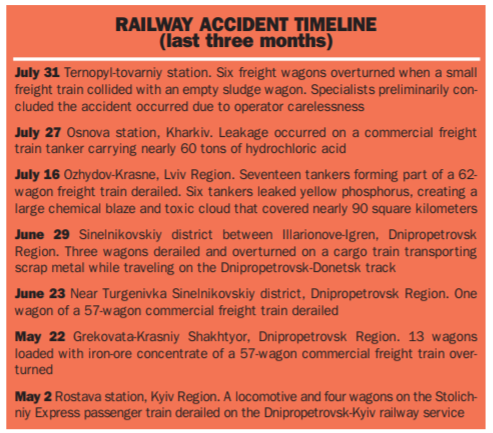Substandard conditions of Ukraine’s state railways point to wider ramifications undermining its reputation as a reliable transit state
Two weeks after a chemical spill on a state railway in western Ukraine started a blaze and sent up a toxic cloud that covered nearly 90 square kilometers of countryside, the last of the chemical debris was shipped out of the country on July 30 without a hitch.
Whether or not the disaster caused long-term damage remains to be determined, but top government officials have expressed concern that the incident may carry wider ramifications for Ukraine’s reputation as a reliable transit state.
Transportation and Communications Minister Mykola Rudkovsky said that repairing the section of train tracks damaged by the July 16 accident should cost $1 million. In all, Ukraine’s government has allocated over $3 million from the state budget’s reserve fund toward liquidating the consequences of the accident and removing contaminated soil.
Health officials have said that all victims hospitalized for toxic inhalation were in stable condition. The government has agreed to pay for all medical services needed to treat health issues related to the accident.
Meanwhile, in explaining why part of a freight train carrying 15 tankers full of yellow phosphorus derailed two weeks ago on its way from Kazakhstan to Poland, state bodies in charge of Ukraine’s railway infrastructure were quick to blame the Kazakhstan-based shippers for the accident.
The catalyst
On July 16, 15 tankers filled with yellow phosphorus, a toxic and highly flammable chemical, derailed and six tankers leaked, sparking a fire and causing a large toxic cloud to form over the region. More than 1,000 people living in nearby villages evacuated the area, and by July 19, 145 people were hospitalized.
Ukraine’s transport and communications ministry and the state-owned national railway company, Ukrzaliznytsya, have been quick to shift blame onto the Kazakhstan company Kazphosphat, the owner of the tankers, for safety breaches. Both also brushed away accusations that substandard condition’s of Ukraine’s state railways were the main cause.
Ukraine’s Transport and Communications Ministry has said that safety violations were to blame for the accident. In a statement July 23, the ministry said that some of the tankers exceeded the permissible cargo limit by 5 tons and that the water level of some of the tankers did not comply with safety standards.
Semen Krol, head of the Presidential Secretariat’s regional policy department, said some of the tankers had crossed into Ukraine’s territory with safety violations.
Kazphosphat has denied the accusations, saying that their tankers were in compliance with regulations and were in good condition. The company has also announced plans to change its transport route to go through Belarus in the future.
The blame game
With a laundry list of seven railway accidents in the past three months alone, some government officials, as well as President Viktor Yushchenko, have called for the resignation of Rudkovsky for what they said was mishandling of the accident.
“The un-professionalism of the leaders of the Transportation Ministry poses a threat to national security and may undermine Ukraine’s reputation as one of the world’s leading transit states,” a July 31 press release on Yushchenko’s website quotes his Deputy Chief of Staff Viktor Bondar as saying.
Earlier, on July 23, the Our Ukraine-People’s Self-Defense Party backing Yushchenko called on Prime Minister Viktor Yanukovych to suspend Rudkovsky. However, Yanukovych has not issued a public response.
In response to criticisms, in a July 31 press release, Ukraine’s Transportation Ministry reported financial breaches by the ministry’s former leadership loyal to Yushchenko. In line with the accusations, a state auditing body reported that the ministry’s previous management incurred $4 million in losses to state coffers.
Bondar, one of Rudkovsky’s main critics, was the Transport Minister during this period. Last week, Bondar offered to return as Transport Minister and called for the ouster of Rudkovsky, a Socialist, and a member of the governing coalition led by Prime Minister Yanukovych’s Regions Party.
This week, politicians continued exchanging jabs over the accident, yet few addressed the problems affecting the country’s aging and increasingly debilitated Soviet-built railways, whose infrastructure is in dire need of overhaul and repair. Despite repeated announcements by top government officials that billions of dollars of investment for the railways is just around the corner, upgrades plans have been repeatedly stalled.
Problems facing the railways have affected business as well.
Yelena Putova, an operator with the railway department of a large international freight forwarding company, said that companies in the business of transporting cargo across Ukraine’s borders using the state railways face several difficulties.

Putova, who has been working in the freight forwarding business for over 10 years, said that the biggest problems were faced when European shipments needed to be reloaded at Ukraine’s borders, when any movement of cargo can cause damage. The need to reload is due to the incompatibility of European gorge wagons on Ukraine’s old Soviet tracks, which require broad gorge wagons, adding that this is a problem for all big companies working in former Soviet countries.
While in her experience companies usually have no choice but to use state-supplied wagons, companies shipping liquids, chemical products or agricultural goods often have their own private tankers.
She said that big freight forwarding companies take into account the reloading problems at borders, where they keep an employee on site to make sure that shipments do not get damaged during the reloading process.
In addition, the state-supplied wagons are usually old and in disrepair, and companies have to take special precautions to ensure the cargo isn’t damaged. This requires using extra materials, like wood and special paper that is used to cover the goods, creating added costs.
Meanwhile, two other incidents occurred on July 27 and 31, with the first of these involving a commercial tank carrying nearly 60 tons of hydrochloric acid on a commercial freight train that sprang a leak. No injuries or widespread ramifications were reported, but these newest incidents have fueled more questions.
